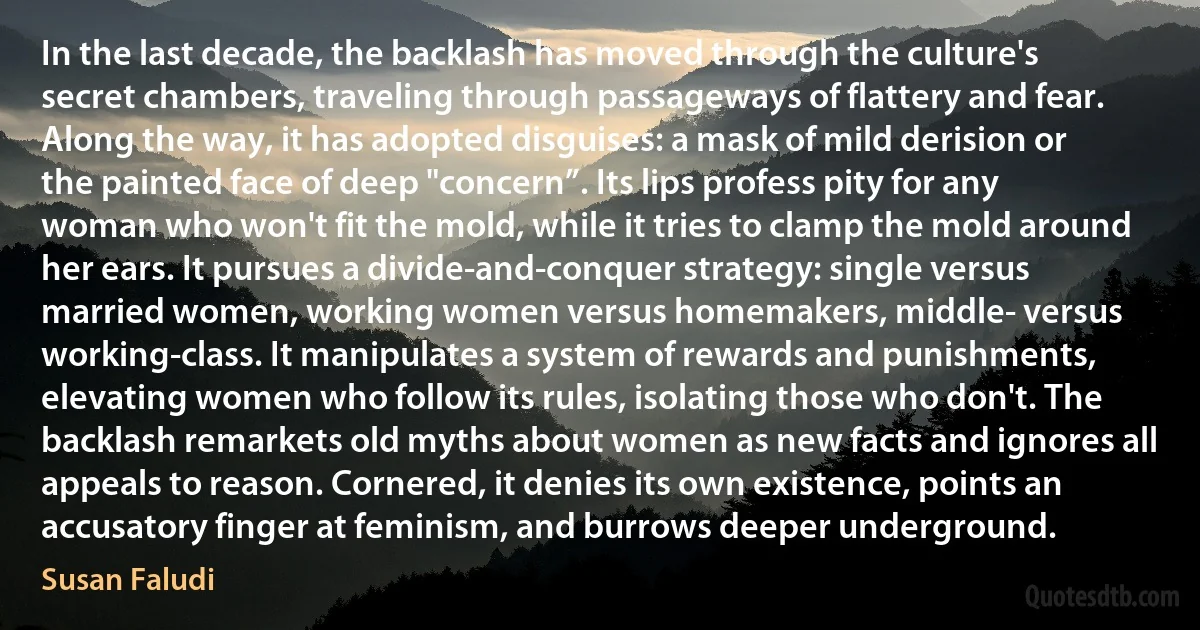
In the last decade, the backlash has moved through the culture's secret chambers, traveling through passageways of flattery and fear. Along the way, it has adopted disguises: a mask of mild derision or the painted face of deep "concern”. Its lips profess pity for any woman who won't fit the mold, while it tries to clamp the mold around her ears. It pursues a divide-and-conquer strategy: single versus married women, working women versus homemakers, middle- versus working-class. It manipulates a system of rewards and punishments, elevating women who follow its rules, isolating those who don't. The backlash remarkets old myths about women as new facts and ignores all appeals to reason. Cornered, it denies its own existence, points an accusatory finger at feminism, and burrows deeper underground.
Susan FaludiRelated topics
backlash deep derision face fear finger fit flattery follow women last married mask middle pity reason secret single way while woman working feminism facts lips points RulesRelated quotes
When the streets are paved with brilliants and the skies made of rainbows I suppose you'll be contented and satisfied with red, blue and yellow.... how to satisfy your tawdry friends while you steal back into the mild evening gleam and quiet middle term[? ]. I'll tell you, my sprightly genius, how this is to be done. Maintain all your lights, but spare the poor abused colours till the eye rests and recovers. Keep up your music by supplying the place of noise by more sound, more harmony and more tune, and split that cursed fife and drum.... he [Mr. Garrick] must feel the truth of what I am now saying, that neither our plays, paintings or music are any longer real works of invention, but the abuse of Nature's lights and what has been already invented in former times.

Thomas Gainsborough
The big bankers of the world, who practise the terrorism of money, are more powerful than kings and field marshals, even more than the Pope of Rome himself. They never dirty their hands. They kill no-one: they limit themselves to applauding the show.
Their officials, international technocrats, rule our countries: they are neither presidents nor ministers, they have not been elected, but they decide the level of salaries and public expenditure, investments and divestments, prices, taxes, interest rates, subsidies, when the sun rises and how frequently it rains.
However, they don't concern themselves with the prisons or torture chambers or concentration camps or extermination centers, although these house the inevitable consequences of their acts.
The technocrats claim the privilege of irresponsibility: 'We're neutral' they say.

Eduardo Galeano
When you traveling by bus, it is always difficult to decide whether you should sit in a seat by the window, a seat on the aisle, or a seat in the middle. If you take an aisle seat, you have the advantage of being able to stretch your legs whenever you like, but you have the disadvantage of people walking by you, and they can accidentally step on your toes or spill something on your clothing. If you take a window seat, you have the advantage of getting a clear view of the scenery, but you have the disadvantage of watching insects die was they hit the glass. If you take the middle seat, you have neither of these advantages, and you have the added disadvantage of people leaning all over you when they fall asleep. You can see at once why you should always hire a limousine or rent a mule rather than take the bus to your destination.

Daniel Handler
In France at least, the history of science and thought gives pride of place sciences, sciences of the necessary, all close to philosophy: one can observe in their history the almost uninterrupted emergence of truth and pure reason. The other disciplines, however - those, for example, that concern living beings, languages, or economic facts - are considered too tinged with empirical thought, too exposed to the vagaries of chance or imagery to age old traditions and external events, for it to be supposed that their history could be anything other irregular. At most, they are expected to provide evidence of a state of mind, an intellectual fashion, a mixture of archaism and bold conjecture, of intuition and blindness. But what if empirical knowledge, at a given time and in a given culture, did possess a well defined regularity.

Michel Foucault
After two years of traveling almost exclusively to Western Europe and the Middle East, Poland feels like a geopolitical spa. I visited here for just three days and got two years of anti-American bruises massaged out of me. Get this: people here actually tell you they like America -- without whispering. What has gotten into these people? Have all their subscriptions to Le Monde Diplomatique expired? Haven't they gotten the word from Berlin and Paris? No, they haven't. In fact, Poland is the antidote to European anti-Americanism. Poland is to France what Advil is to a pain in the neck. Or as Michael Mandelbaum, the Johns Hopkins foreign affairs specialist, remarked after visiting Poland: "Poland is the most pro-American country in the world -- including the United States."

Thomas Friedman
